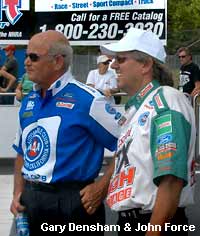| 
  How could they do better? How could they do better?
Densham: I think it’s a situation that’s been prominent for the last 20, 30 years that I’ve been in the sport; that virtually all the new sponsors that have been brought into the sport have been by racers. They’ve done the homework; they’ve beat on the doors; they’ve begged the guys and kissed their butts and taken them to dinner and finally got them signed up out here; and then NHRA will take their share when it’s all said and done.
I think that anything (sponsorships) that does come in [through NHRA] seems to be channeled by NHRA to the three or four major teams.
Take something, for instance, like the Ameriquest deal that came in this year. That was hyped up for half a year and they threw that out there between Force and Schumacher and Prudhomme and Bernstein and it looked like meat in a shark tank. And when all was said and done, it ended up being an associate sponsor on Don Prudhomme’s car. And yet, NHRA still gets what they wanted out of it, there’s a kiosk out here—and I’m happy that they’re here, we need them—but the amount of money that Prudhomme got would’ve funded my entire team. Now, how come it went that direction?
 Do you think NHRA is helping the racers get sponsorships? Do you think NHRA is helping the racers get sponsorships?
Densham: They spout the idea that they’ve got a policy that says nobody will be involved in our sport unless they’re a part of a team and that sounds good, but the reality is that it isn’t. If you go down [the list of] official this or the official that of NHRA, or even companies that sponsor the races, take a look at how many of those are not on racecars. So, do I think there could be some major improvement there? I really do.
 So as a racer/team owner, are you unhappy right now? So as a racer/team owner, are you unhappy right now?
| ADVERTISEMENT |
 |
|
Densham: Am I unhappy? No, I’m not unhappy. But do I think it could be better? Darn well I do. I mean, you look at the situation where we’ve raced the last four years now without a raise, while obviously our costs went up tremendously (Editor’s note: After this interview date, NHRA and PowerAde announced a $1 million total increase for the pro classes in 2006). We need more crew people; we need more equipment; we need more spare parts. We need all this because we need to make the 75-minute turnaround. And the idea of putting moratoriums on engine components, their thought process is that it makes it more affordable, but in the real world it doesn’t. It makes it so those that have more of the best are going to be more successful; it’s that simple. So I’m not sure that I agree 100 percent with what they’re doing on that point. We do race on some racetracks that are old enough that their shutdown areas could be a problem if we go much faster, so I understand a lot of what they’re trying to do there. But as far as trying to keep the costs down I don’t think they’re doing a darn bit of good. It just continuously escalates and a lot of it has to do with policies that they’ve implemented.
 When
changes are made does NHRA keep low-budget guys like you and
Jeff Arend “in the loop,” so to speak, to the
same degree it does with Force, Schumacher, or Prudhomme? When
changes are made does NHRA keep low-budget guys like you and
Jeff Arend “in the loop,” so to speak, to the
same degree it does with Force, Schumacher, or Prudhomme?
Densham: No, definitely
not; absolutely, positively not. We have certain sets of rules
that are okay for those guys and certain sets of rules that
are okay for us guys. And I’m not even saying that they
don’t deserve some sort of special treatment in certain
cases, but is our sport really going to be good if it’s
owned by four or five major people? NHRA would be scared to
death. I mean, they’ve kept us under their thumb because
you can’t get 50 racers to agree on anything. But if
all of a sudden there’s only four or five [owners],
they might be able to agree on something, so I think they
(NHRA) should be worried.

|
